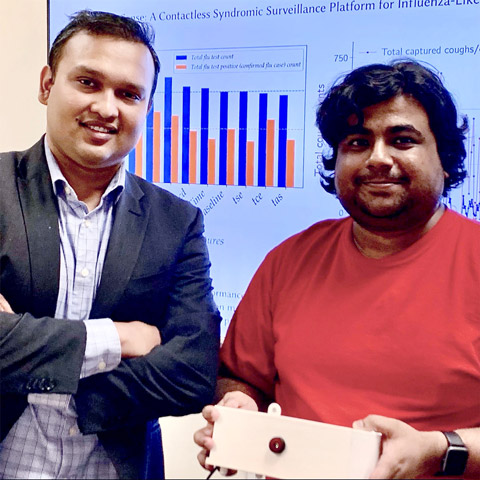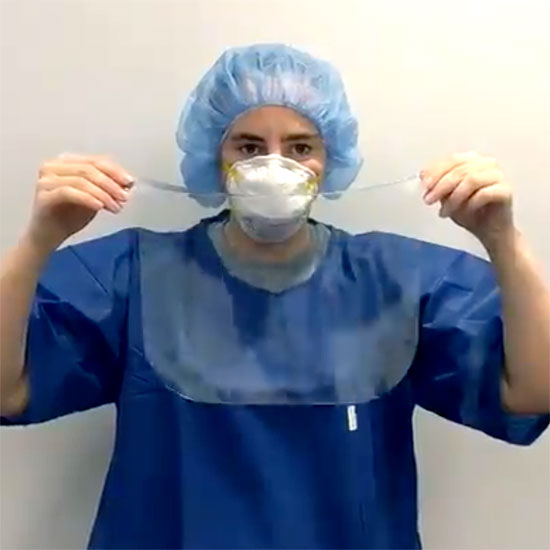Computing & COVID-19: How CICS Research is Supporting the Pandemic Response
The outbreak of COVID-19 last year has initiated a global health and economic crisis, leaving few parts of daily life untouched. The scope of its challenges, however, go beyond stay-at-home orders and social distancing measures. At the University of Massachusetts Amherst, a broad coalition of faculty, students and staff, including those from the College of Information and Computer Sciences (CICS), are working to address the challenges of combating the disease. From creating early diagnostic technology to improving contract tracing and prediction models, their research contributes to the scientific advancements at the forefront of the effort to combat the pandemic.
Analyzing the Spread
 Interpreting Cough Sounds
Interpreting Cough Sounds
CICS Assistant Professor Tauhidur Rahman and CICS doctoral student Forsad Al Hossain developed FluSense, a new edge-computing platform that can detect coughing and crowd size. Using thermal imaging and neural network technology, their device accurately predicted daily illness rates when tested at UMass Amherst. Rahman and Hossain envision the extension of FluSense to hospitals, healthcare waiting rooms and larger public spaces, expanding the arsenal of health surveillance tools used to forecast seasonal flu and other viral respiratory outbreaks, such as COVID-19. Read more about their design.
Improving Forecast Modeling
UMass Amherst researchers are working on a method to combine existing models to provide a more accurate view of coming infection rates. To address the discrepancies of singular trend predictions, the UMass Influence Forecasting Center of Excellence has developed the COVID-19 Forecasting Hub, an “ensemble” model which pulls information from various sources across the globe. The hub includes interactive visualizations of four-week forecasts for COVID-19 cumulative deaths, both by state and for the entire U.S. The center’s director, Nicholas Reich, coordinated the curation of forecasts along with Katie House, a recent UMass Amherst computer science master’s program graduate, and Nutcha Wattanachit, a biostatistics PhD student.
“Forecasting COVID-19 is a completely different ballgame because we can’t rely on 20 years of public health surveillance data like we have for flu,” says Reich. “Modeling has been such a central part of the COVID-19 discussion. This is really a massively important resource.” Learn more about their project or visit the Forecasting Hub to see the models.
Informing Communities
Tracking and predictive modeling are not just important for professionals; user-friendly data for citizens helps inform personal decisions and protect communities, too. Focusing on a local level, CICS doctoral student Abe Handler created a website that displays COVID-19 case counts in Western Massachusetts. Using data reported by the New York Times, Handler’s site provides daily updates on the number of new cases reported, growth rates, and simplified graphs showing the trends for each county. Visit his site.
 Protecting Health Care Workers
Protecting Health Care Workers
In order to fully combat the outbreak, workers require proper physical equipment, especially face protection. Researchers at UMass Amherst, working in coordination with engineers, nurses and other health care professionals, have developed a design for protective plastic face shields and have made it available to manufacturers to mass-produce personal protective equipment.
Jim Flynn, the new CICS assistant dean of research business development, led the search for manufacturers, and K+K Thermoforming of Southbridge, MA produced the first order of 80,000 shields. UMass Amherst contributed more than $30,000 for the initial order, in addition to the hundreds of volunteer hours spent designing, testing, revising, and manufacturing the shields.
“The campus response to requests for help to address COVID-19-related shortages has been extraordinary,” said Institute for Applied Life Sciences director Peter Reinhart. More than a dozen COVID-19 response teams on campus are working to help healthcare workers and others with needs, on projects including face shields, ventilator parts, and viral transport medium tests. Read more about the project.
Addressing Stress in Academia
UMass Amherst faculty are conducting research into broader effects associated with the pandemic on academic workers. CICS Assistant Professors Narges Mahyar and Madalina Fiterau, CICS Research Assistant Professor Ali Sarvghad, and CICS doctoral students Iman Deznabi and Tamanna Motahar have created a nationwide survey to assess the impact that the COVID-19 outbreak has had on academic communities.
Through participant responses, the team will analyze changes in health, levels of stress, levels of isolation, productivity, and financial stability. In the survey, the researchers explain that “determining the most affected aspects of people’s lives is the first step in moving towards mitigating the negative effects of the outbreak.” The data they gather aims to, ultimately, inform future design tools that will benefit the academic community in the face of the pandemic. Participate in their 10-minute survey for academic workers.
Aiding Global Projects
Students and faculty at UMass Amherst are offering their time and guidance through Computing Against COVID-19, a project based in New England that connects groups developing applications to fight the pandemic with computing experts able to provide help and support. CICS Senior Teaching Faculty Jaime Dávila, CICS graduate student Gursimran Kaur, and CICS undergraduate students, Aryaman Agrawal, and Jarod Sagendorph are all volunteering through the site, providing guidance for projects including app development, data science, and programming. Visit the Computing Against COVID-19 site to view current projects and get involved.